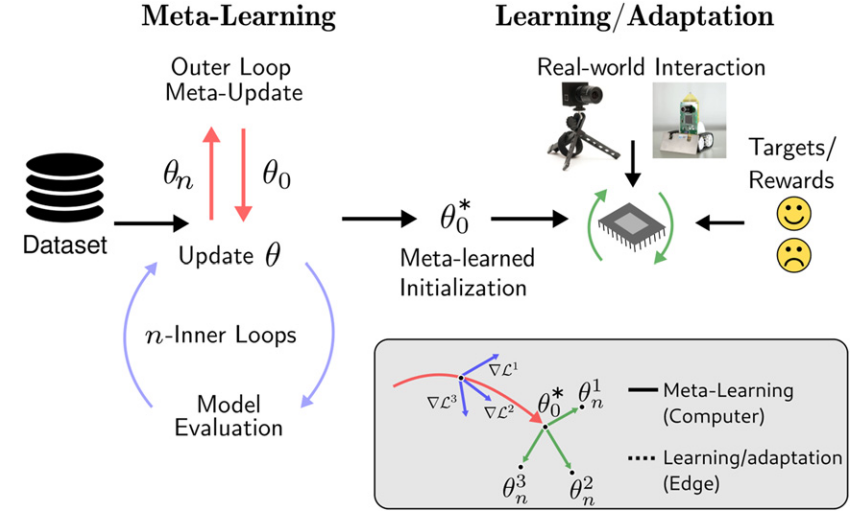MSc thesis project proposal
[2023] Meta-learning for low-cost adaptive neuromorphic hardware
Real-world, online learning of new tasks is one of the most challenging and rewarding goals of Artificial Intelligence (AI). While conventional AI algorithms and deep learning are not well suited for this due to algorithmic and hardware challenges, the brain can learn very efficiently by building new knowledge on top of prior knowledge.
This MSc project aims to build brain-like online learning using neuromorphic hardware inspired by the architecture and dynamics of the brain. Neuromorphic chips implementing spiking neural networks (SNNs) and equipped with synaptic plasticity [1] can efficiently approximate the key mathematical processes that underlie gradient descent used to train neural networks. However, two challenges are currently left open: (i) these plasticity mechanisms inherit some of the drawbacks of deep neural networks, namely their data and power inefficiency during training, and (ii) neuromorphic approaches currently fail to achieve deep-learning-like accuracies, especially when considering constrained hardware resources and limited synaptic resolution. In this project, you will investigate meta-learning, an emerging machine-learning technique that allows tuning the training process in order to learn faster and more efficiently (i.e. learning-to-learn), to compensate for the non-idealities of synaptic plasticity in neuromorphic hardware (see [2,3] for early works in this direction). Key research goals include:
- the use of meta-learning to mitigate algorithmic and hardware inaccuracies incurred low-cost neuromorphic implementations, for example to improve performance during quantization-aware training or for problems that require memory (i.e. long-time-horizon problems),
- the design of meta-learning-enabled digital neuromorphic architectures.
[1] Frenkel, Charlotte, and Giacomo Indiveri. "ReckOn: A 28nm Sub-mm2 Task-Agnostic Spiking Recurrent Neural Network Processor Enabling On-Chip Learning over Second-Long Timescales." IEEE International Solid-State Circuits Conference (ISSCC), 2022.
[2] Stewart, Kenneth Michael, and Emre Neftci. "Meta-learning spiking neural networks with surrogate gradient descent." Neuromorphic Computing and Engineering, 2022.
[3] Zhenming Yu, Nathan Leroux, Emre Neftci. "Training-to-Learn with Memristive Devices", IEEE International Electron Devices Meeting (IEDM), 2022.
Requirements
For this multi-disciplinary project, background in machine learning and digital design is required.
Previous experience with neuromorphic architectures and meta-learning is not expected.
This project will be in collaboration with Prof. Emre Neftci at Forschungszentrum Jülich and will be coupled with a 15-ECTS internship there. A relocation allowance during the internship will be offered.
Interested students should send a motivation letter together with their CV (incl. course transcripts and grades) to Dr. Charlotte Frenkel at c.frenkel@tudelft.nl
More MSc proposals for Dr. Charlotte Frenkel will appear in the coming weeks, interested students are encouraged to reach out by e-mail to enquire about upcoming projects.
Contact
dr. Charlotte Frenkel
Electronic Instrumentation Group
Department of Microelectronics
Last modified: 2023-12-02
